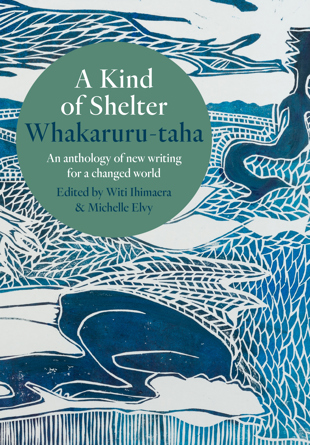Skip back three years or so to when the world was beginning to understand what the COVID-19 pandemic would be. It’s here that writers and editors Witi Ihimaera and Michelle Elvy began to consider the project that would become A Kind of Shelter Whakaruru-taha. This book is not a pandemic anthology. It encompasses much more, taking the reader to places before, after and through this time, and many voices from Aotearoa and abroad tell stories of who we were and are, and of the challenges that have long been with us—decolonisation, indigeneity, climate change.
From the opening, we are placed firmly in Aotearoa. This whare pukapuka is a whakaruru-taha: ‘a warm and cosy haven away from the winds and cold’, inside which are gathered ‘76 creative thinkers—poets and fiction writers, anthropologists and biologists, musicians and visual artists, and more.’ An expectation is set as to what we might encounter and feel; ‘In dialogues across space and time we look from Aotearoa New Zealand outward to the world’, to voices from across the globe ‘that explore identity and change, motherhood and healing, war and legacy, ancestry and shared history, art and music and the natural world’, from writers who write in te reo Māori, English, Mandarin, Arabic, Greek or Cantonese.
The eminent writers in the anthology are an incredible lineup: there are current and former poet laureates Chris Tse, Selina Tusitala Marsh, Cilla McQueen, Vincent O’Sullivan, Ian Wedde and David Eggleton; there’s fiction by Tina Makereti, Emma Neale, Wendy Parkins, Whiti Hereaka, Patricia Grace and Erik Kennedy; there’s creative non-fiction by Alison Wong, Renee Liang, Sonya Wilson, Linda Matisoo-Smith; and there’s kōrero between the likes of Aparecida Vilaça, Dame Anne Salmond and Witi Ihimaera, and Ru Freeman and Paula Morris.
Visual art from eight artists, including Yuki Kihara, Oliver Jeffers and Maureen Lander, collectively entitled ‘We are the Custodians’, ‘provides equally powerful ways of seeing, feeling, thinking’ and speaks of ‘What we take with us, what we leave behind, what we will lose if we continue to ignore Papatūānuku’s warning.’
Read Rachel Smith's review here.


